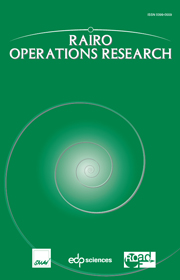Article contents
Une procédure de purification pour les problèmes de complémentarité linéaire, monotones
Published online by Cambridge University Press: 15 April 2004
Abstract
Dans cet article, nous proposons une nouvelle méthode de purification pour les problèmes de complémentarité linéaire, monotones. Cette méthode associe à chaque itéré de la suite, générée par une méthode de points intérieurs, une base non nécessairement réalisable. Nous montrons que, sous les hypothèses de complémentarité stricte et de non dégénérescence, la suite des bases converge en un nombre fini d'itérations vers une base optimale qui donne une solution exacte du problème. Le procédé adopté sert également à préconditionner l'algorithme de gradient conjugué lors du calcul de la direction de Newton.
Keywords
- Type
- Research Article
- Information
- Copyright
- © EDP Sciences, 2004
References
- 1
- Cited by




